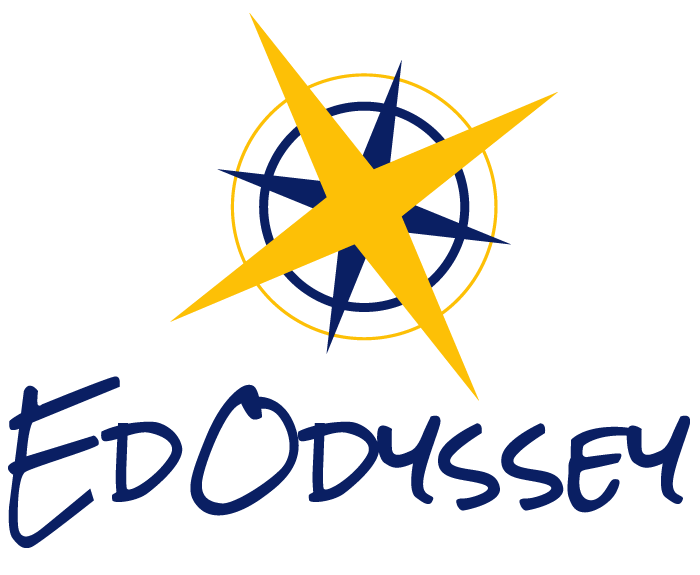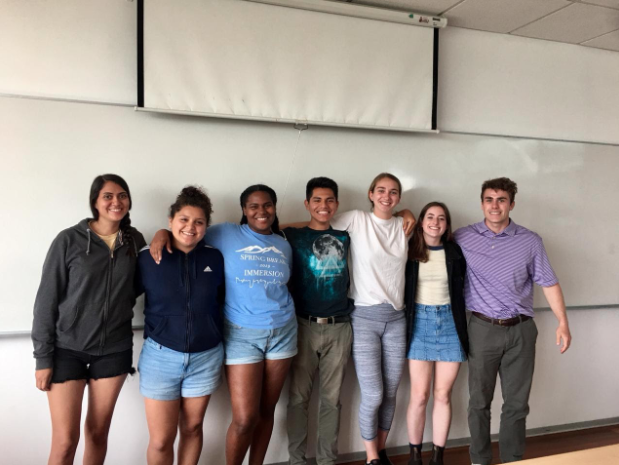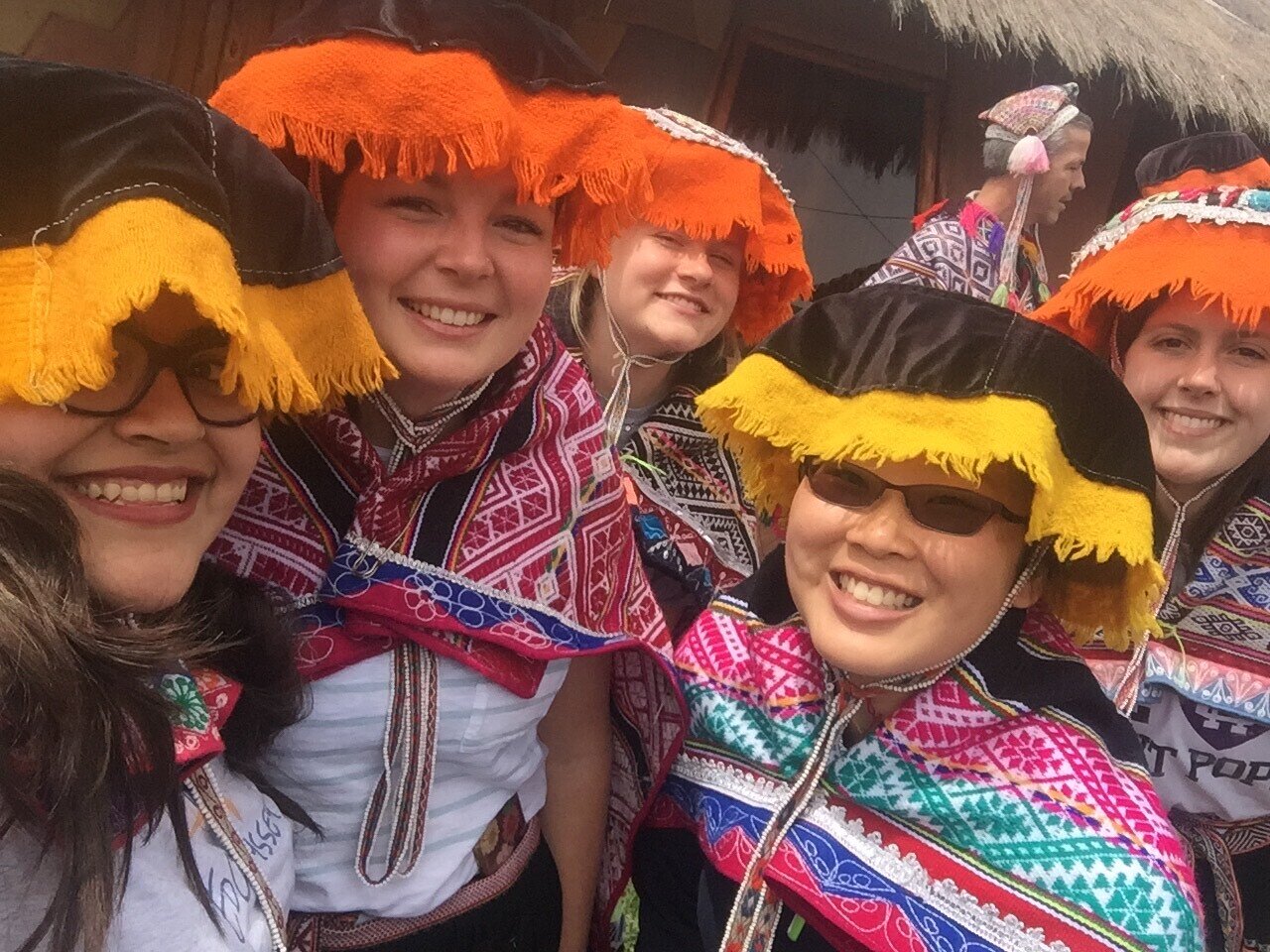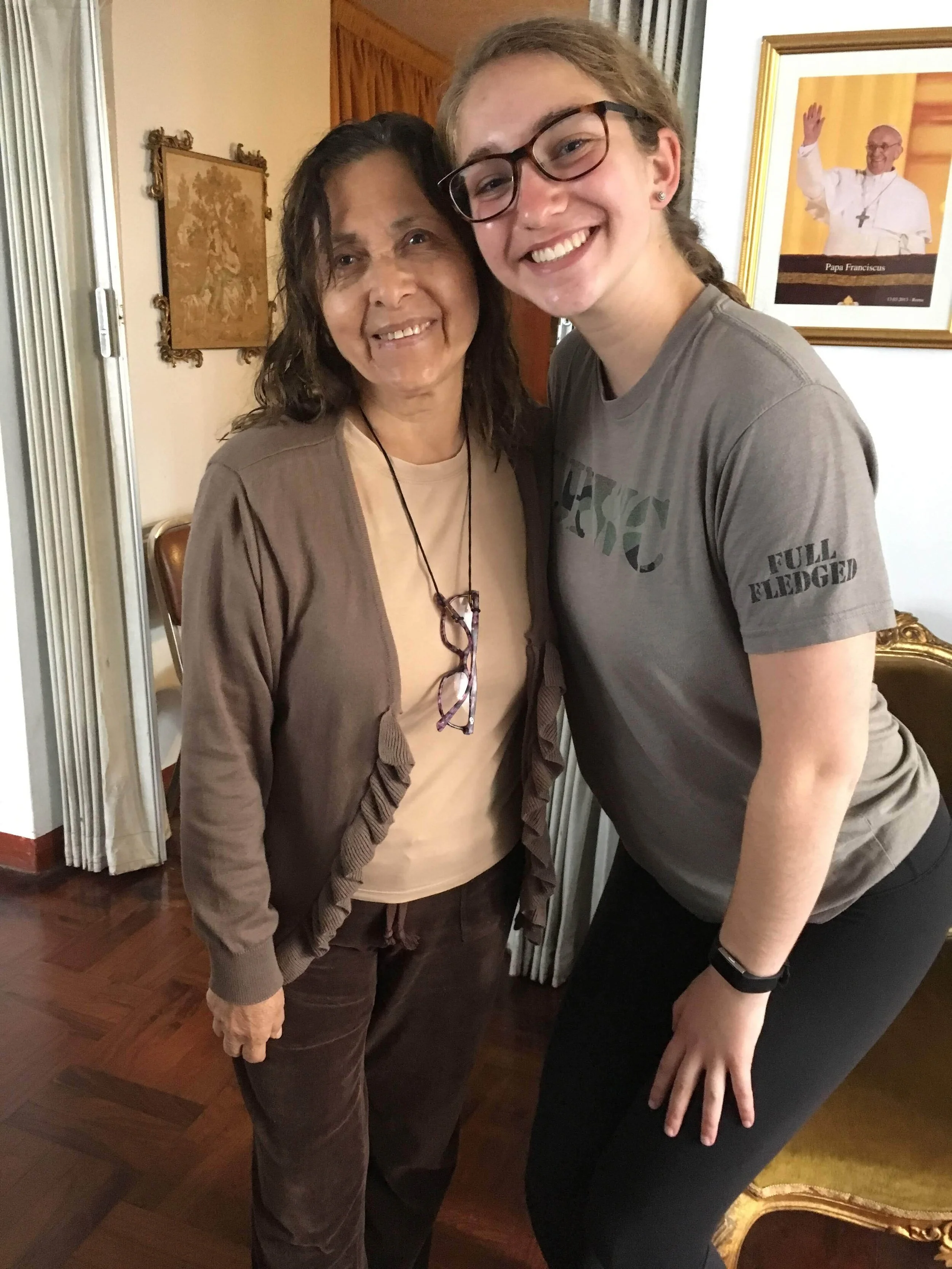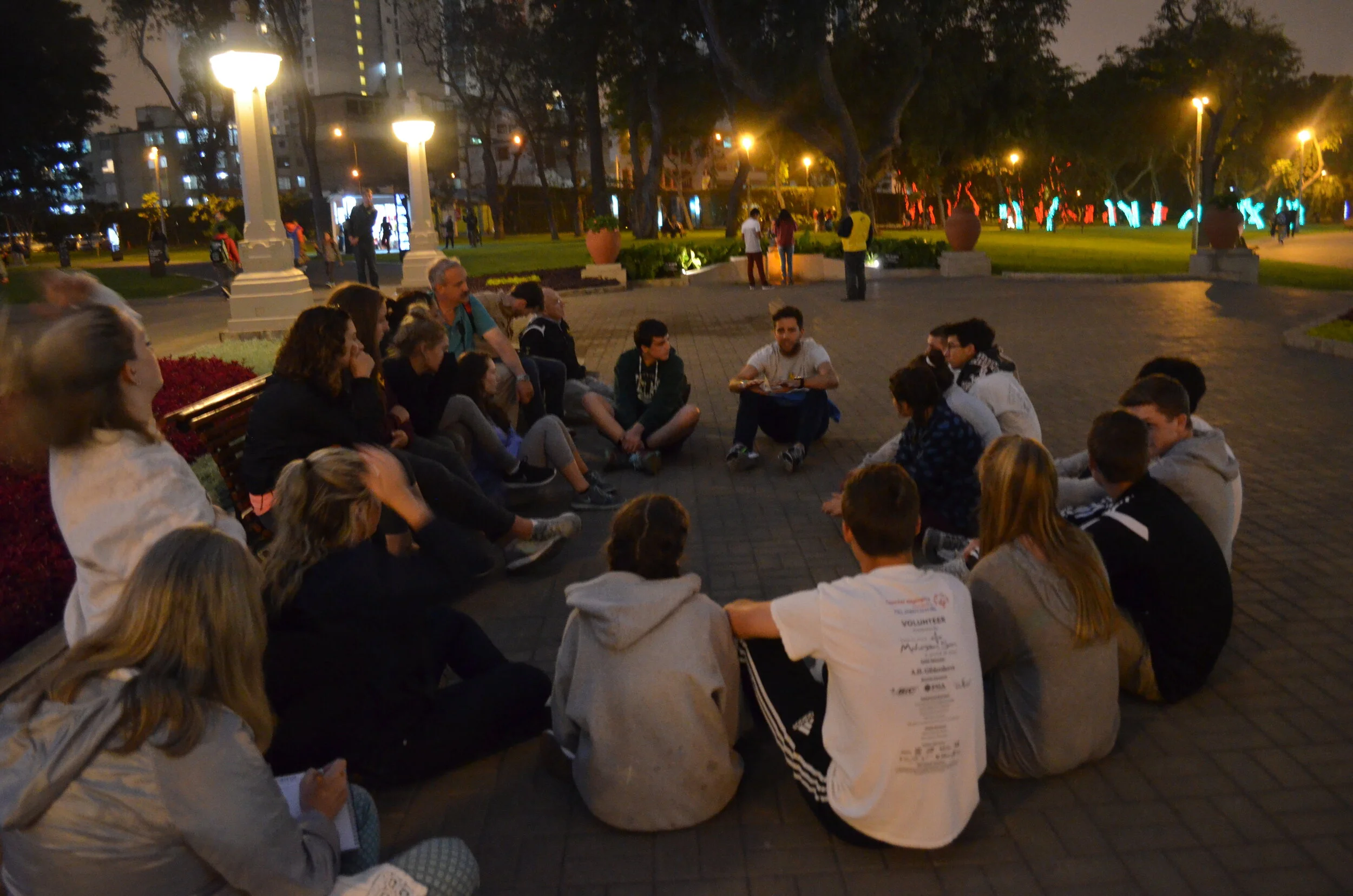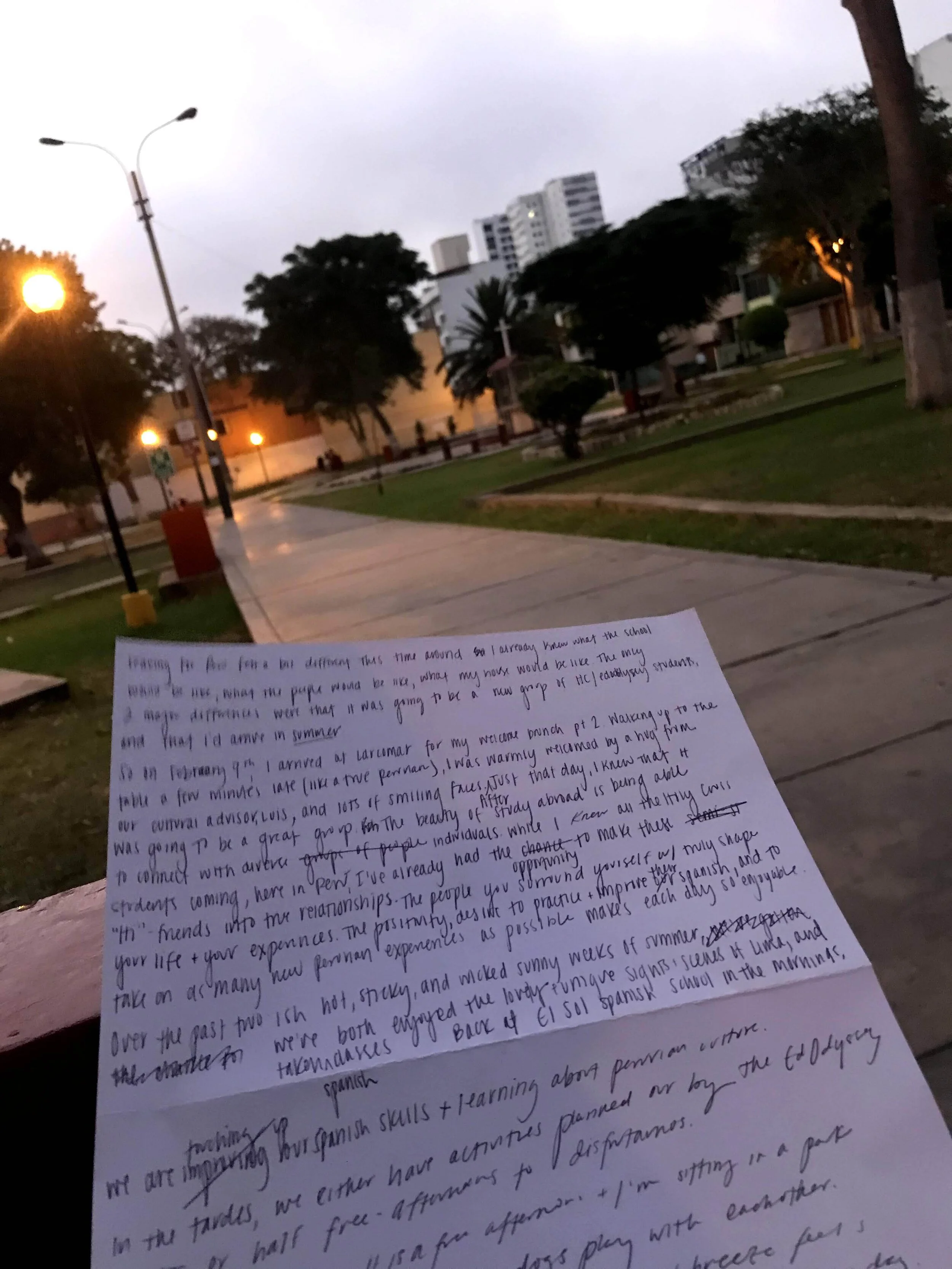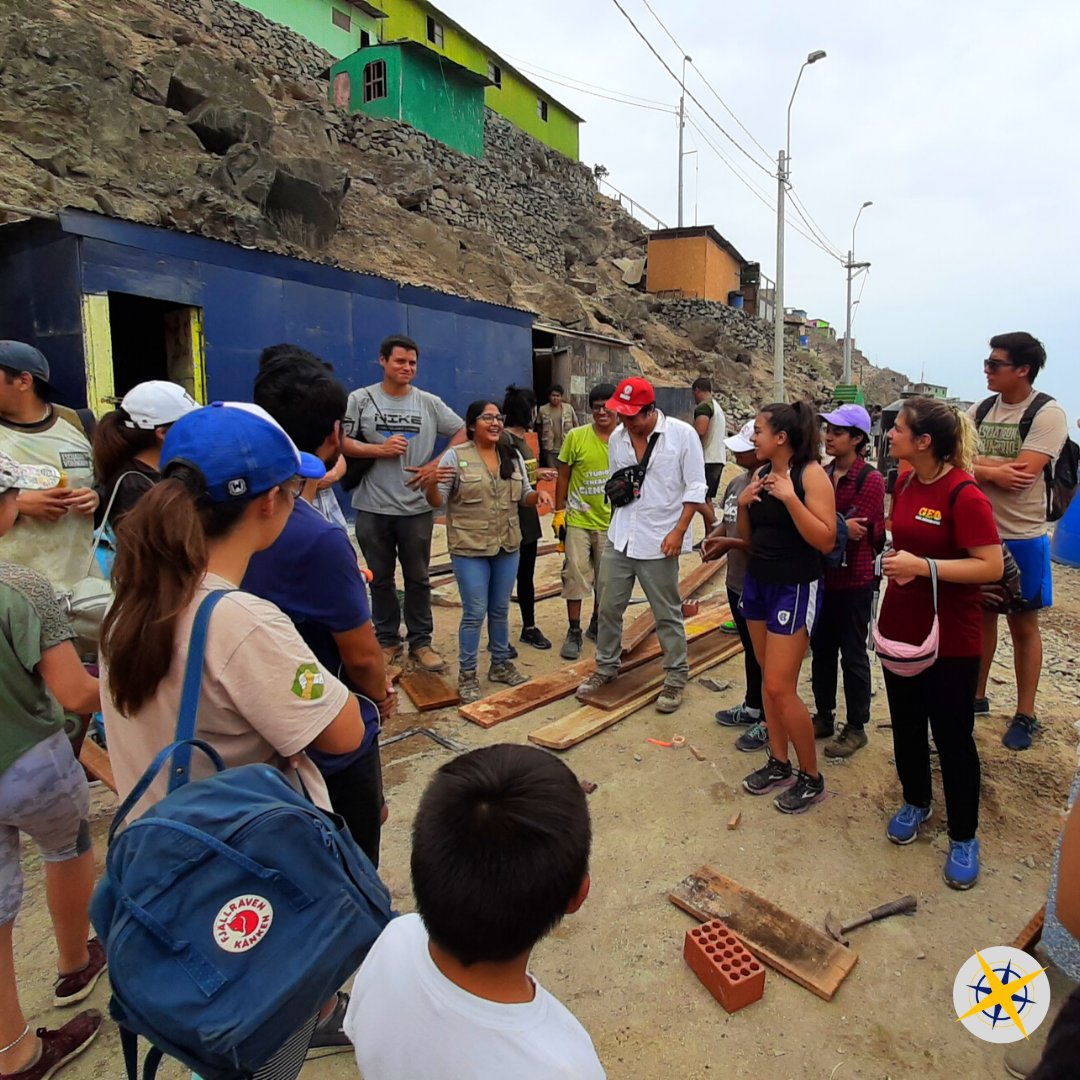Why Gratefulness in 2021 Matters
The entire world breathed a collective sigh of relief when the clock struck midnight on New Year’s Eve and the calendar read 2021. However, if you are still feeling exhausted, drained and stuck under the weight of 2020, our team wants to let you know that you are not alone and we felt important to reflect on this sentiment and to keep it all in perspective.
A new year and new semester is now underway, but it is never too late to reflect on what last year left us with, and to ask ourselves: was everything we went through even worth it? How could we really take something positive out of such an intense year?
The entire world breathed a collective sigh of relief when the clock struck midnight on New Year’s Eve and the calendar read 2021.
However, if you are still feeling exhausted, drained and stuck under the weight of 2020, our team wants to let you know that you are not alone and we felt important to reflect on this sentiment and to keep it all in perspective.
Grateful for Challenges
Although we’d all like to pretend the past year didn’t happen, or that it is already in the past, it’s important that we pay very close attention to all those challenges that made it such an intense year and to learn from them.
To many of us, 2020 meant a significant and major change on our routines, plans, goals and on our personal structures too.
And for you, if you’re a high school or college student, it meant a significant change in terms of your learning process, but also your way of socializing. You adapted to new ways of studying, communicating and connecting not only with your classmates and teachers but with your friends and family too, and you worked to overcome those difficult challenges.
The challenges that you’ve faced as an individual within a bigger society have left us with major lessons about solidarity, justice, and adaptability that we all need to implement in our current, respective lives. Collectively, we’ll take these lessons to build a new one that goes beyond society itself and structure a new sense of community: a much more conscious, compassionate and responsible one.
Just as for us, as a company and as a group of individuals from around the world: many of our plans had to change when the pandemic hit, and we were suddenly stuck in a dense uncertainty cloud with no clear path in front of us. However, it was right in the middle of the crisis that our team found a way to rise above the challenge of the pandemic together, as we’ve always been, and luckily with the same team we had at the start of 2020.
Grateful for Innovation
For our team, we created two passport-free programs to provide students the ability to connect with an international experience, even if it was virtual. Our Virtual Study Abroad program in partnership with the most prestigious university in Peru, Pontificia Universidad Católica del Perú. Additionally, our team created an unbelievable Medical Spanish & Latinx Patient Program integrated Medical Spanish language classes.
Each program had workshops focused on latin culture backgrounds too that are both online and affordable options for students in need of, even under hard circumstances, continue learning and exploring into global perspectives.
Grateful for Growth
So, how could each and everyone one of us feel grateful for 2020? During last year, have you reflected on the fact that challenges, such as economic and political crises and health systems collapsing, have always been a common thing in the world?
They didn’t start in 2020, but somehow no year has ever brought out in such a uniform way, how necessary it is to start thinking even more collectively and to take responsibility for ourselves and others, and how little we really need to live happily.
Challenges will always be a common denominator that we all need to adapt too. So, going from there, why don’t we start approaching life from a grateful, wider perspective and focus on everything we have instead of everything we lack?
Let’s appreciate what last year taught us.
Let’s not forget all of those things that let us shine our truest and most vulnerable essence.
Let’s grow into kindness, respect and care for and to one another.
Let’s see life from a grateful approach.
Take a minute to think about this and reflect: what are you grateful for today?
Our team is hopeful the world will become a better and safer place for all of us. We are grateful for being alive, healthy and for the incredible opportunity to keep doing what we love most, despite what’s happening in the world.
As our organization looks ahead, we are very excited to welcome a new year with you and thrilled to tell you about all of what we have planned for you both online and through future in-person programs.
This 2021 is filled with travel opportunities we need to know how to take advantage of in the most careful and responsible possible way.
Want to keep connected with us and learn more about our programs ahead? Don’t forget to follow us on all of our social media below! Let’s get it started!
Maintaining a Positive and Thankful Relationship with Study Abroad Experiences
In the age of COVID-19, we all know that we can’t predict the future or know what exactly is to come. But let’s have some hope!
In the age of COVID-19, we all know that we can’t predict the future or know what exactly is to come. But let’s have some hope!
As a study abroad alum whose experience was cut short, I’ve learned over the past year about taking each new experience in stride, and being thankful for opportunities and the lessons you learn from facing adversity. Using connections, reaching out, and keeping a positive outlook on the future will set you up for personal success and positive experiences.
Over the past year, my experiences have helped me reflect on the importance of keeping an open mind, staying persistent, and being thankful for the opportunities that come my way.
Building a Life Abroad in Peru: The Positive Effects
In retrospect, I went to Peru to study abroad for the year knowing very little about the country or what I was getting myself into. You can read all you want about a place but nothing can fully prepare you for what you experience.
I am eternally grateful for the seven months I spent in Lima.
During this time, I became a part of my host family and integrated into Peruvian society. In and out of school I learned about Peruvian history and the intricacies of Peruvian culture. With time, I assimilated to new ways of life and of doing things. I reflected on the pros and cons of various aspects of both Peruvian and American society.
My time in Lima helped me grow as an individual, a learner, and a global citizen.
The more I saw and experienced, the more curious and excited I became about understanding the world’s societies and all of its different facets. Returning to the U.S., I was filled with a passion for Peru, Latin America, and learning about cultures.
I knew that this experience was only at the beginning of a lifelong journey of learning, understanding, exploring, and engaging with people of diverse backgrounds and cultures. In the middle of a global pandemic and grieving the loss of my second semester studying in Peru, I was still hopeful for the adventures to come.
Gained Perspective: The EdOdyssey Summer 2020 Internship
When internships were increasingly being canceled due to the COVID-19 pandemic and the sudden shift to fully remote summer internships, EdOdyssey CEO and Holy Cross alumni, Peter McGovern, put an internship opportunity on Handshake for Holy Cross students. With the intent on helping provide a useful summer opportunity for students who may be in a pickle due the pandemic, EdOdyssey was also in need of passionate college students who could help with social media presence, and content creation related to study abroad and international education.
Having come home from Peru in March instead of late July, I suddenly found myself in need of a summer internship. When my friend sent a screenshot of the EdOdyssey Handshake internship post, I was quickly intrigued. While I do not have plans to go into marketing in the future, I am extremely passionate about study abroad and EdOdyssey’s programs.
New Times, New Challenges
The summer internship turned out to be a wonderful learning and growth experience. I have learned invaluable professional skills related to communication, technology, and marketing. I have also grown as a creator, team member, and writer.
A particularly exciting aspect of my internship with EdOdyssey has been witnessing the new virtual programs come alive. A key aspect of the Virtual study abroad program is that students take part in a weekly cultural module with the Peruvian EdOdyssey team.
Seeing the cultural module agenda for the semester, I was excited by how thoughtfully put together it was. From Peruvian history, to soccer fanaticism, to cuisine and music, so much of the Peruvian society I had experienced was covered in the program.
New Opportunities for Study Abroad
More than anything, the virtual programs have shown me the power of taking a challenging time and making the best of it with the resources you have and a bit of creativity.
EdOdyssey didn’t step away from international education when the times got tough. Instead, they innovated and created something new that would still positively impact students and help them grow into global citizens.
This mentality of staying positive is one which I encourage students to have when it comes to studying abroad in the future. For now, virtual opportunities are an incredible way to get a taste of what different places and cultures around the world have to offer. Yet looking to the future, hopefully students will be able to travel again soon and I encourage them to embrace the opportunity and engage with an international community.
Especially after experiencing a global pandemic, traveling to a new country will be particularly interesting to learn about other experiences during these difficult times and how people have persevered just as students in the U.S. have.
Moving Forward: Step By Step
Looking ahead, we can only create conjectures about the future. We don’t know what will happen next week, next month, next semester, or next year. I emphasize this sentiment because staying in the present and valuing the opportunities that come your way will help you prepare for and stay positive as you head into this unknown future.
Valuing and fully taking in every experience we have as a learning and growth opportunity helps align us for new challenges ahead. The unique times right now teach us about perseverance, community well-being, self-care, and the importance of being creative. These are all traits that can be translated to experiences like studying abroad. For young students, these challenging times build a solid foundation for future international engagement!
My time in Peru, which was challenging, fun, and educational in a multitude of ways at the time, has helped me both grasp a more global understanding of the current reality of the pandemic. It guided me to an internship opportunity that has helped me grow professionally and personally while helping out the company.
It’s okay to be nervous for the future and to try our best to plan. But at the end of the day, we have to be thankful for the opportunities we have and keep a positive attitude as we fall asleep and wait for the sun to rise on a brand new day of opportunities.
Step by step, day by day, and week by week, embrace the moments and build upon them to create your own path and your own future. If something doesn’t go as planned, remember that you haven’t even scraped the possibilities that this world has to offer. Go and seize every moment, every opportunity.
Want to know what led me to travel abroad in the first place? Check out my first EdOdyssey blog as an intern to learn more about how my youth experiences inspired me to study abroad!
Starting International Education Week: An Open Letter to Students
Patty Valencia, EdOdyssey’s Peru Coordinator, explains how much study abroad have changed and enriched her life at the start of International Education Week!
Dear Students,
My name is Patty Valencia and I am the Peruvian Program Coordinator at EdOdyssey.
As the International Education Week starts this week, as it typically does in mid-November, I started reflecting on how valuable and resourceful studying abroad truly is. This time, I am not going to put my attention in the academic nor the cultural side, but the personal, friendly one.
As the program coordinator, I have seen many of you come and go. All arrivals have always been different, I can’t argue that. Some of you come exhausted for the long flight. Others come tired but truly enthusiastic and then we have the ones with an impenetrable look and silence treat, quite an enigma.
So yes, arrivals are all different and uniques. But the farewells? Oh, the farewells.
You see, it is not a small decision to live abroad for half of year or an entire year. It is a big decision that implies a lot of smaller choices, especially if you decide to move to Peru, this beautifully different country than your own.
But let me be completely sincere about something here. That great gap between your culture and ours, between your country and mine, and between your possibilities there and here. All of it means your experiences will easily be the biggest effect of your experience in Peru. Or as I see it: personal growth.
I am not saying here that your entire time in my country will be negative, but I am saying it can indeed take you out of your comfort zone.
That’s for sure.
Your experience will present you a range of realities, some harder than others, and it can fiercely force you to reflect. Your time abroad will make you go deep inside yourself as an individual and question all those things you may have taken for granted.
Your experience can, and it most likely will, make you see yourself in a different light and in connection with others. It can really shape a different you. A more conscious, grateful, and humble version of you.
That future you, from my perspective, is the most powerful effect about your experience here. And I promise, it won’t go away.
In my eyes, if you ever ask what do i prefer: if hellos or goodbyes (you haven’t asked but I am going to answer just in case), I prefer the goodbyes. And not because the fact of saying goodbye, but because of the light, love and growth that I see shine in your eyes.
Those looks of you after those last hugs are fuel for me. They the exact thing that makes me love my job the most.
I miss you all so much. Keep shining that beautiful light of yours onto the world. For now, take care of yourselves, kids!
Hasta que nos volvamos a encontrar,
Patty
Want to take your first step toward an in-person experience? Check out our virtual study abroad here!
6 Concrete Ways to Keep the Abroad Alive: Returning Home & Rentry
Embrace the ways in which you have changed through the experience and all that you have learned. There are numerous ways to carry on your international education experience after the international portion has concluded. Your time abroad is the first aspect of a phase of growth that you are setting off into. After your time abroad has concluded, the new perspectives, knowledge, and opportunities gained abroad will continue to influence your future growth.
When the study abroad experience comes to an end and you’re back at home, it may feel like it is all over. Suddenly it feels as though an incredible, potentially life-changing, experience has come to a close.
How can this international experience continue even after you have returned home?
Embrace the ways in which you have changed through the experience and all that you have learned. There are numerous ways to carry on your international education experience after the international portion has concluded. Your time abroad is the first aspect of a phase of growth that you are setting off into. After your time abroad has concluded, the new perspectives, knowledge, and opportunities gained abroad will continue to influence your future growth.
Finding opportunities to reconnect with various aspects of your study abroad experience will facilitate continuous growth and a sense of connectedness with the country you studied in and may return to one day!
Pulling from my personal experiences returning home from studying abroad in Lima, Peru, I have compiled a few tricks for continuing to stay connected to your study abroad experience even after you have returned home. Your experience doesn’t have to be over when you leave the country!
1. Read the News
Keeping up to date with news from the country or region where you studied abroad is a great way to stay connected to the experience you had. This is one thing I wish I had done even before coming home. Reading the local newspapers and watching news helps contextualize names, places, and events that sometimes get thrown around in classes or by locals.
2. Stay in Contact
It may not feel natural to reach out to your host family, program leaders, or professors after you have returned home, but these are supportive connections that can last a long time and be beneficial if you keep contact. I was nervous to call my host mom for a while after I got home, but when I got on the phone with her, a smile ran across my face as my Spanish flowed fluently and I could hear great pleasure in her voice.
Social media and whatsapp are great ways to stay in contact with friends and connections long after you have returned home. I have found that messaging group chats with the friends I studied abroad with has been wonderful for reminiscing on memories, funny moments, and experiences we had abroad. Having a place to talk with people who have had a similar experience to you can be extremely helpful.
3. Pursue opportunities to share out
Share your experiences with others. Whether you join a study abroad ambassador program at your university to promote the value of studying abroad, or simply talk to your friends and family about your experiences, sharing out will help you process everything. Moreover, you may inspire someone to travel to or learn more about the place you lived.
4. Embrace International Films
With a little bit of searching, you can likely find numerous movies that are available for viewing from your host country. If, like me, you studied in a country that spoke a non-english language, find movies or television shows to watch that are in the foreign language! Streaming platforms have become great sources of international and foreign-language films.
If you are interested in or studied abroad in Latin America, or want to practice your Spanish oratory skills, check out Cinegogia for some Latin American film ideas! Search by country, subject, language, and more!
5. Listen and Learn from music
Similar to movies and television, listening to music from the country or region where you studied abroad is a great way to feel connected to the place and people you have physically left behind. As I write this, I am listening to a Colombia singer who I had never heard of before going to Peru. For me, listening to certain songs often evokes certain memories and emotions from times abroad. Hearing songs can transport you back to those moments.
6. Improve the study abroad experience for future students
Study abroad alumni have the most powerful insight in regards to what the study abroad experience is truly like. In order to improve the experience for future students, your study abroad office and/or study abroad provider would likely LOVE to hear about your experiences and thoughts for how to improve the program.
Additionally, you may be able use your personal experience to offer ways to help these offices and companies to reach out to and inspire students to participate in the study abroad program that has positively affected you.
Hopefully some of these ideas will be helpful for those who have, or soon will, return home from studying abroad. The experience does NOT have to end when you get home. This is simply the next phase of the journey. The steps you take after returning home will build toward your future visit to the country or your next journey. Your study abroad experience is a launching pad for your future. So much awaits you!
Want to learn about international programs online that you can do to keep the vibe alive? Check out our newest Virtual Study Abroad program opportunities for the upcoming semesters!
Three Tips for Better Connecting to Your Study Abroad Experience
Intentional moments of reflection help you actively engage with your thoughts and emotions related to different experiences. While studying abroad and living a multitude of new experiences, it can be particularly helpful to slow down and think about all that you are experiencing.
Intentional moments of reflection help you actively engage with your thoughts and emotions related to different experiences. While studying abroad and living a multitude of new experiences, it can be particularly helpful to slow down and think about all that you are experiencing.
On GoOverseas, a current EdOdyssey Peru team member, Patty Valencia, wrote of a powerful moment that she witnessed during an EdOdyssey immersion trip in Peru:
“After dinner, Peter - the President and Global Founder of EdOdyssey - led the group’s nightly reflection and I was moved by the students’ words. They were talking about how great and life changing their whole experience of being in Peru had been and how great [it] was to see people being so happy with what they had, and supportive of each other even when they hadn’t much to offer.”
Before, during, and after a study abroad experience, taking time to reflect on your values, beliefs, experiences, goals, and passions will help you fully engage with your experience and your inner emotions.
PREPARING FOR THE UNKNOWN
As you prepare to study abroad, pause and think about your emotions, expectations, and fears, because doing so will help you set goals for the experience and guide what you look to get out of your time abroad. The day before I left to study abroad in Lima, Peru, I remember feeling completely unprepared and nervous about the experience that was to come. Acknowledging your worries and fears is okay and completely normal before a new experience.
Before you head off to study abroad, consider some of these questions:
What are some of your passions?
What are you most excited about? Most worried about?
Why did you choose to do this experience?
My ice skating coach used to say before competitions that if you are nervous, that just means that you care. If you feel nerves before you study abroad, that is 100% normal and likely means that you care about this new experience and are anxiously anticipating the unknown that waits ahead. Accept that nervousness is part of the experience and remember that there are people who are there to support you throughout your journey abroad.
REFLECTING THROUGHOUT YOUR ABROAD EXPERIENCE
The three main reasons why reflections are an integral part of EdOdyssey programs are to build trust and communication, to unpack our observations, and embrace emotions, are all also relevant while studying abroad. As you experience a new culture, face adversity, and adapt to a new environment, pausing to reflect on all you have gone through will help you both learn and grow.
Handwriting a blog at a neighborhood park in Lima
Some popular manners of processing and reflecting on experiences are journaling, blogging, talking with classmates, program leaders, or other supportive relationships, and silent reflection. These forms of reflection can be done daily or weekly, or sporadically throughout the experience.
When asked about the value of reflecting while abroad, Hui Li, who studied abroad in Italy and 2020 summer intern with EdOdyssey, shares that:
“Blogging, journaling, or doing any kind of recording/reflection on something like study abroad puts an abstract concept like time, experience, and growth into a concrete medium that you can use to put the things you learn into perspective. You have something in the physical realm that you can look back on like a timeline and use as a means to track your progress. By having a concrete record created over time, you can better assess how much you've grown since your first days abroad.”
Taking in one of the Seven Wonders of the World with incredible friends!
THINKING BACK, LOOKING FORWARD
Coming home from being abroad can be a difficult experience. You may experience reverse culture shock after being immersed in a different culture for a long period of time. You have likely said goodbye to many friends or host family members who you do not know when you will see again. Additionally, you have had numerous unique experiences that others around you have not had. Reflection will help you process why returning home may have left you with a flurry of emotions.
As you look toward your next adventure after studying abroad, you can think about how you’ll use your study abroad experience and takeaways to create the future that you want for yourself. Think about all the experiences you had abroad and take time to reflect on them, talk about them, and process them.
Some questions that helped me when I returned from study abroad are the following:
What new passions do I have now?
What are some things that I learned while abroad?
What are some experiences when I felt most happy? Most sad or uncomfortable?
What are some moments when I was most proud of myself?
These questions are great because you can reflect not only on your experiences, but on how they affected you and how you can work to create more proud and passion-fueled moments in the future.
For some more ideas about post-study abroad reflection, check out Amanda Lowrey’s blog called Six Helpful Questions to Reflect on Your Study Abroad Experience!
The Peruvian Divide: Race, Ethnicity, Class & Status
The mission and responsibility of EdOdyssey starts with serving our students and the world through experiential learning. As leaders in international education, our organization feels compelled to raise our voice against racial discrimination and violence and to educate on the differences that exist within societies abroad.
The mission and responsibility of EdOdyssey starts with serving our students and the world through experiential learning. As leaders in international education, our organization feels compelled to raise our voice against racial discrimination and violence and to educate on the differences that exist within societies abroad.
As a Peruvian citizen, and a member of the EdOdyssey team, I’m sharing perspective on the Peruvian experience with racial divide that exists so any student that comes for an immersion program or semester has more context and a wider perspective when visiting Peru.
Peru’s History: Roots of Racism & Imperialism
Racism in Peru has its origins as old as the history that led to the formation of its territory. The first meeting of the Spaniards with the last Peruvian Inca, known as Atahualpa, in 1532 was one based on domination and violence. Narrations of historians at the time tell how the group led by Pizarro presented a Bible to Atahualpa and demanded him to renounce his pagan beliefs.
Depiction of the encounter between Francisco Pizarro and the Inca Atahualpa by chronicler Guaman Poma de Ayala, circa 1615 Photo Credit: Amautu Diaries
Atahualpa, not knowing what a Bible nor Christianity was, discarded the object, triggering anger in the Spaniards at the sight of such profanity. They then used this as justification to submit the native Peruvians and begin what was known as the Viceroyalty of Peru.
The process was not peaceful. Wars were fought, blood was shed and the indigenous population was reduced to numbers dangerously close to extinction. The start of the Viceroyalty of Peru was one based on the notion that the native Peruvians were a people that lived in ignorance.
Wars stripped them from their possessions, and they were cast out to the outskirts of the city of Lima to areas that were called The Inca Reductions. Walls were erected to prevent the Inca descendants from mixing with the Spaniards. Some portions of that wall can still be seen in Lima today.
A New Form of Division: Classism
From that point on, there would be a disparity between Spaniards and native Peruvians, both in economy and education. This inequity would continue even throughout the history of Peru as a Republic, as being from an ethnic background different from the European meant you would have fewer opportunities in life, making racism merge with a new form of division: classism.
Links Between Ethnicity & Social Status
And the same way Incan buildings remain in modern-day Peru for everyone to see them, classism and racism are still very present. You will notice, for example, that the city of Lima has some variability of the ethnicity of their population according to where in Lima they reside. The majority of people living in the outskirts of the city are descendants of Native Peruvians, and the people living in the richest, most central parts of the city are of European descent.
We can go as far as to describe that oftentimes houses in the richest parts of the city of Lima have a housekeeper of sorts called “la empleada”. This at-home worker will mainly come from one of the outskirts of the city and their ethnicity will almost always be Native Peruvian. The name of empleada has been recently changed to trabajadora del hogar.
The reason for this change is very revealing: to say empleada implies meaning of someone being used, employed for something, in an example that critics have called modern-day slavery. To say trabajadora del hogar roughly translates to house worker, and it is a clear effort to move away from the utilitarian view of the less fortunate citizens.
Indeed, language is power.
Hand-In-Hand Connection: Race & Social Status in Peru
We can also see this in modern-day Peru. Part of our Study Abroad Program involves experiences that show the enormous economic and racial divide especially in the Lima area. With service day-trips to the less fortunate areas in the capital, like the Sagrado Corazon de Jesus School or the District of Ventanilla, students can experience firsthand the difficulties and challenges that people in these areas face day to day, and how this is highly tied to racial divide.
Ramon Castilla, three-term president of Peru. He abolished slavery in the year 1854. Photo Credit: La Biografía de Ramón Castilla.
One of the biggest challenges is the lack of presence of the government in these areas, which results in lack of public investment. This means no running water, no public schools, and poor security as opposed to the richer areas of the city. In these areas people make the most out of what they have, and schools like Sagrado Corazon de Jesus survive from donations and the goodwill of citizens and volunteers like you and me.
Indeed, one of the first things you notice once you get acquainted with the city of Lima is how quickly its appearance changes depending on where in the city you are. Just a thirty-minute drive can mean moving from the richest, most luxurious parts of Lima, to the poorest developing areas where people earn a day’s pay in order to survive.
Lima, The City of Kings, is not immune to great social distancing in the shape of expressions that cause division. With all its history and cultural legacy, there’s still much to be worked out. We are not immune to racism.
How Can We Help?
We can start by having experiences and conversations that help us to fully understand the challenges that our people have in our communities, to know that we are no different to one another, and that equal opportunity is essential for a society to grow in harmony.
As human beings, we feel drawn to those things we know and things to which we can relate. We build bridges and relationships when we take the first step, we board that plane to a country we’ve never been to before. We live their reality, we suffer the pains of daily life, we go through thick and thin.
And that’s what we aim for when we build, offer and host a Study Abroad program. It is not just a social visit. It is a soul-building, mind-changing experience. To spend a semester in Peru means we have opportunities to guide our students, be with them, to show them the beauty of the country, but also to explain the things we need to work on as a people and why that is important.
“Many people can hear about places where poverty impacts the communities everyday, but actually being there in person demonstrates a much larger picture of how each community overcomes the obstacles thrown in their way.” Grace, 2019 Study Abroad Alum
For those who visit us short term there is still an opportunity to learn, as we remain with our groups for the entirety of their visit, monitoring and guiding our experiences to make their short stay as thorough as possible in terms of culture and social issues. At the end of each day we conduct a group reflection, to exchange ideas and build on our experiences.
And in that journey, we grow.
Peru is a wonderfully diverse country, in every dimension we can think of. My fellow Peruvians and I have been blessed to have such a rich and deep history, and as we have much room for social improvement, we dedicate our lives to building cultural and digital bridges to take that first step and reach out, clear the mist of difference, and heal.
Want to learn more about more of Peru’s more recent history? Check out Peru's Recent History: A Story of Struggles and Growth!
